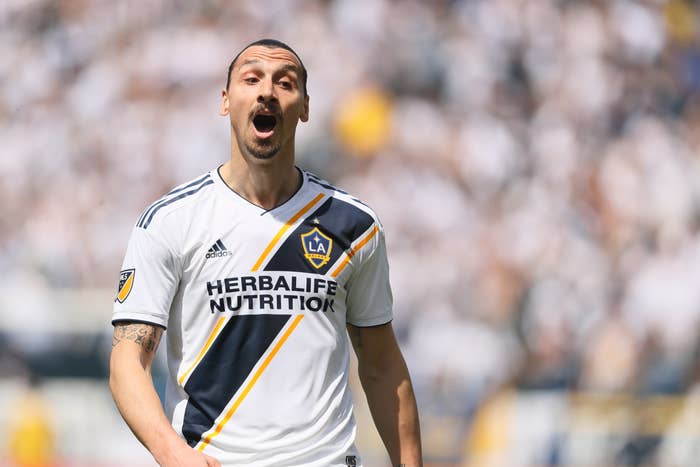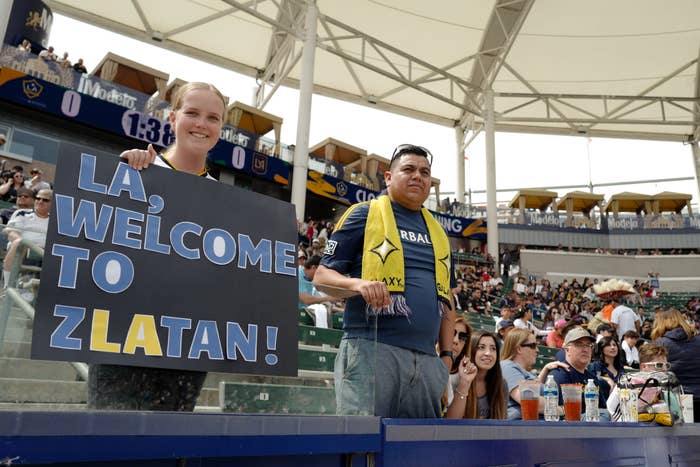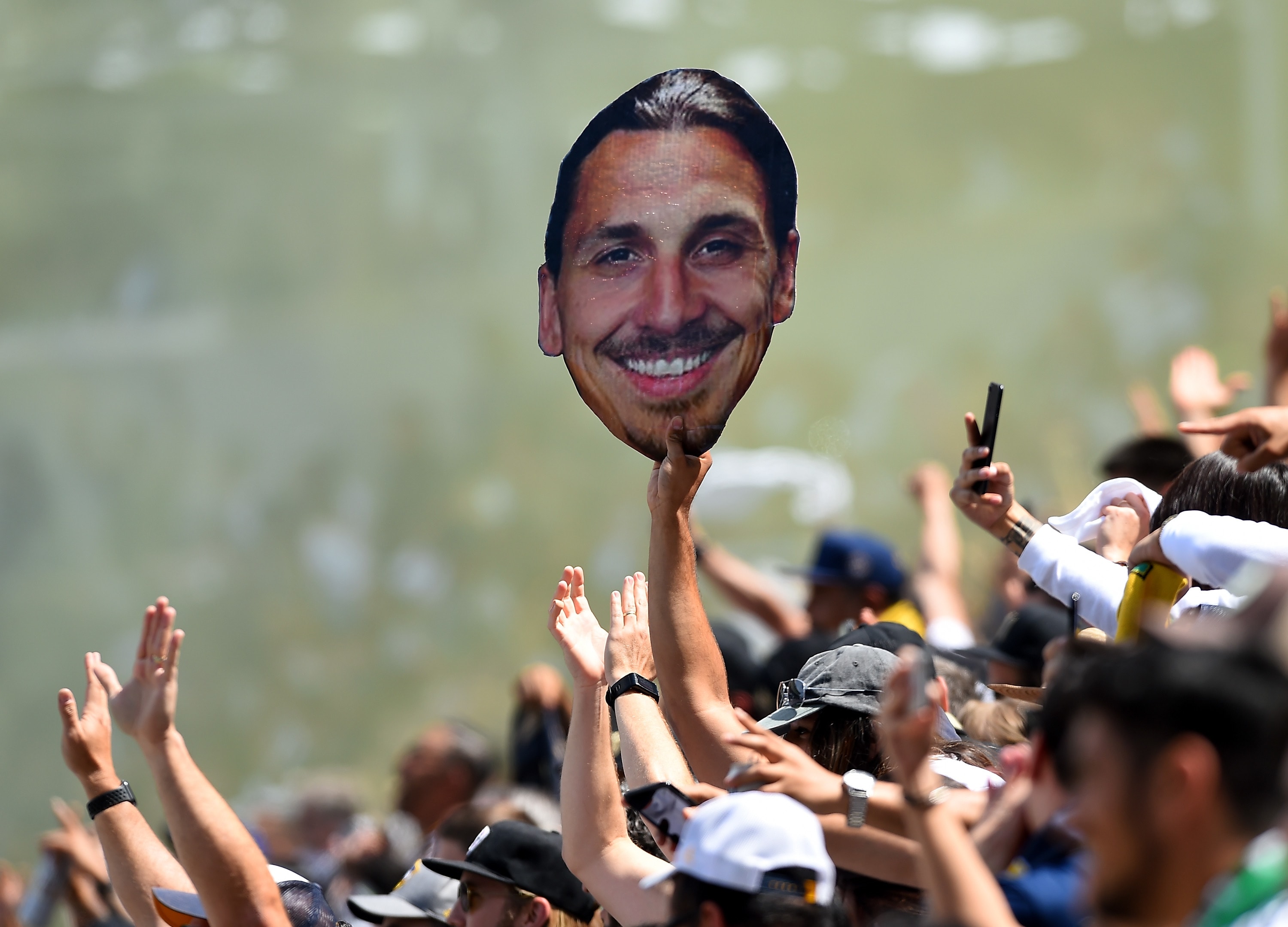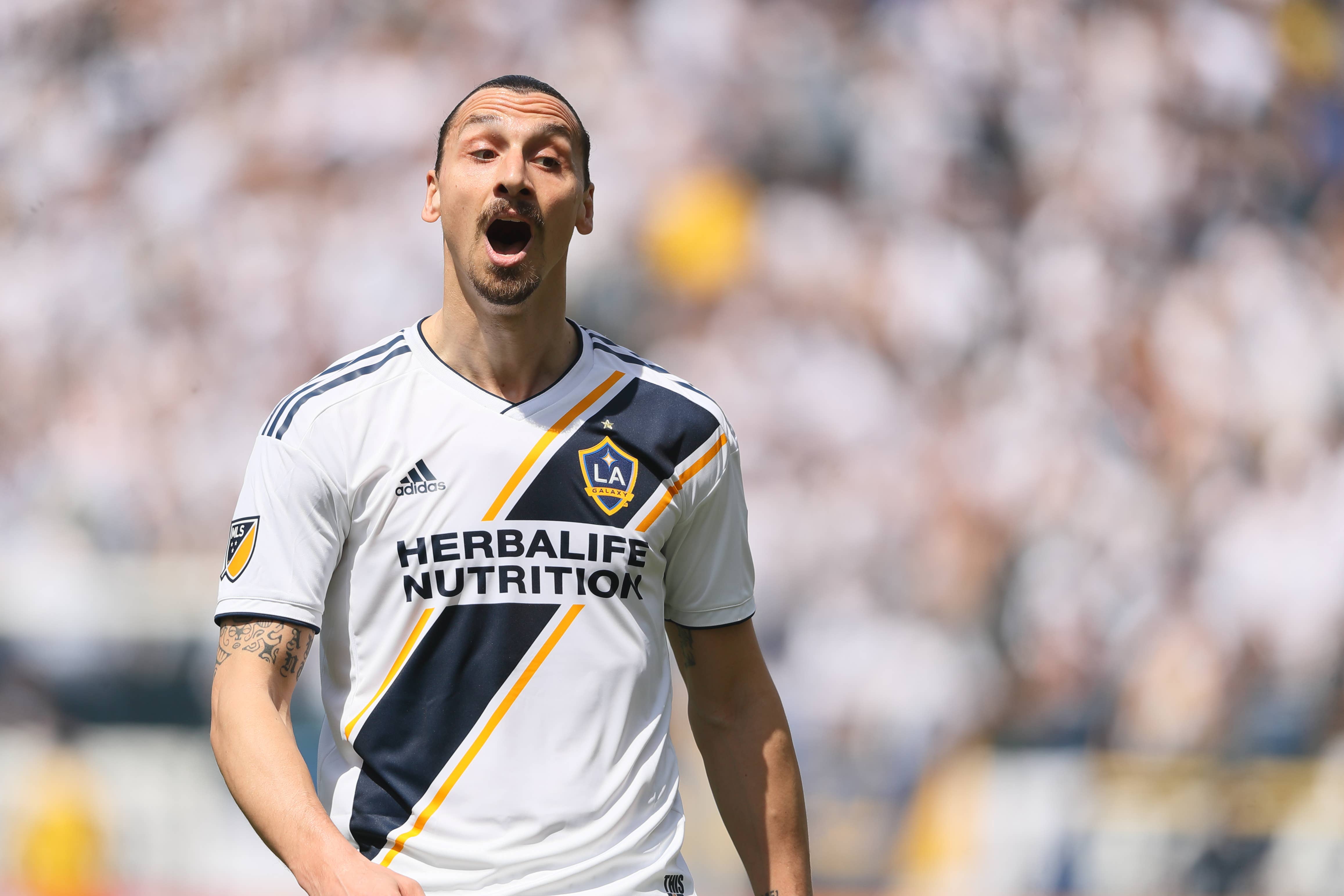
With two touches of the ball on Saturday, Zlatan Ibrahimovic made the biggest headlines of the MLS season so far this year. Helping the Los Angeles Galaxy take down new crosstown rival Los Angeles Football club, 4-3, this news only ranks slightly above the announcement of the Swedish striker leaving Manchester United to join the Galaxy, which holds a record of five MLS Cup victories. The rich get richer, and Ibrahimovic’s move to American soil has some people again talking that “soccer is finally going to catch on in the States" talk.
Ibrahimovic’s move to Los Angeles was only outdone by the way that he announced it. Taking out a full page in The Los Angeles Times, he simply wrote, “Dear Los Angeles, You’re Welcome,” leaving the whole page blank except for his signature at the bottom. The proclamation was as bold as the player who made it, and the news was big for soccer in America, which many feel still needs validation, although MLS has passed France’s Ligue 1 and Italy’s Serie A in attendance numbers.
But it’s also predictable.
This isn’t the first big-name player to join the Galaxy, or MLS for that matter. There’s been David Beckham, Robbie Keane, Steven Gerrard, Landon Donovan, and the list goes on. He likely won’t be the last, either. But the fascination around Ibrahimovic, who’s currently 36 years old and coming off a knee injury, isn’t a new concept for American soccer fans, or those who are trying to convert to the sport.
Maybe this formula of selling us fleeting football legends is ingrained in the American soccer fan’s DNA. In 1975, the New York Cosmos signed Pele, arguably the greatest footballer to ever live, and it gave birth to the country’s ever-growing fascination with soccer. It also laid a blueprint for how football clubs could sell tickets: Bring in huge stars who are no longer looking to compete at the highest levels in Europe.
There’s been a long-held belief that MLS is a retirement league for international superstars. Once the stars of the Premier League, La Liga, and Serie A have reaped the glories of the Champions League and domestic titles, they move to Los Angeles, New York, or even Chicago and live the life of a semi-retired footballer while still adding zeroes to their bank accounts.
There's an ideology that the way to build a successful league is to have the biggest and best players. But those people don't appear over night or just come with the signing of a contract. Good football comes from nations that invest in the sport, train their youth, and don't have some ridiculous pay-for-play scheme that only allows for rich kids to dedicate their time and thrive in the sport. Want good football? Invest in America's youth and build the league around them. Look what happened to the U.S. Men's National Team in its attempts to qualify for the World Cup, rolling an aging team onto the pitch to lose to Trinidad & Tobago, while all this young, American talent is playing in Europe.

It’s also been said that the MLS is inferior to the other leagues of the world. The thinking goes, Americans don’t know good soccer, because the product available in the States is so poor compared to the rest of the world. If only we could witness the beautiful game, we’d understand what supporting football was all about.
This is the same thing you’ll hear from the Euro Snob who lives in Brooklyn and goes to Legends at 8 a.m. on a Saturday to watch Arsenal—that's always been his club, although he’s not English and been to London once on a high school field trip—and has only stepped foot in an MLS stadium to watch an international friendly between Real Madrid and Bayern Munich. Or the time he went just to see Thierry Henry play.
The only match they watched that was played in the U.S. last year was The Clasico. As soon as the big names go away, so do they, preferring to watch the European game or strictly follow the U.S. Men's National Team. They're the people who fill out beer gardens in cities across the country every World Cup, but have no clue what the second division of soccer in the States is. (It's the USL, by the way).
This sentiment has been echoed by MLS Commissioner Don Garber, who it pains me to give credence to. In a recent interview on Fox 5 New York with reporter Tina Cervasio, the question was posed, “I’ve spoken to a lot of different sports fans in this building, some who are fans of the elite European leagues, and they have said, though, ‘Oh, I find MLS hard to watch.’ What is your message to them?”
Garber responded, “There are the followers of the game overseas that might never become MLS fans. Thankfully their children and their friends who are connected to great cities where we have clubs that are very relevant, that have star players that are entertaining. We’re continuing to earn our stripes, if you will, for that sophisticated European soccer snob, as we like to call them.”
The most interesting word in his response was “sophisticated.” This is sports. It’s not elite, country club endeavors such as golf or tennis. There should be nothing sophisticated or high-brow about a fan or supporter’s experience. It’s about drinking beer, being loud, and having fun. The idea that we need an intelligent level of football play in America to love a sport is beyond mind-numbing.
Will Zlatan help bring people to the stadium? Yes. Will Zlatan help TV ratings? Absolutely. But the issue with Zlatan being in L.A. has nothing to do with Zlatan or L.A. at all.

The reason Americans and soccer aren’t taken seriously has little to do with whether or not they understand the intricacies of tiki-taka football. It’s more than we don’t support the sport seriously. We, to a certain extent, lack the regional tribalism that makes following a football club worthwhile. We jump ship from club to club when a big-named player arrives, like a giddy teenybopper awaiting the next boy band to have a No. 1 single.
When word came out that Ibrahimovic was going to L.A., I saw more than a few people announce their allegiance to the Galaxy, who have zero connection to Los Angeles or California. The same people who came out in crowds of nearly 70,000 to see Beckham play at Giants Stadium are nowhere to be found, as the New York Red Bulls struggle to fill their arena. It’s a flash in the pan. Once the player is gone, so is the interest.
The fairweather nature of these "supporters" is on full display, and it's no secret. There was even a fan seen changing from a Galaxy jersey to an LAFC jersey in the middle of the match this weekend.
That doesn't mean there aren't good supporter groups in the MLS. Clubs such as New York Red Bulls, Toronto FC, Montreal Impact, and San Jose Earthquakes all boast legitimate ultras groups that gain respect around the world. And Portland Timbers and Seattle Sounders have been known to have huge turnouts on a regular basis. But the average person with a slight interest in the sport in the States, or even the ones who love the Premier League but hate MLS, have a long way to go from fawning over big-ticket international players. That's not to say that the Galaxy's support is awful. I know a few of their guys, and they're alright.
LAFC, which is essentially a reboot of Chivas USA and playing their first year in the MLS, had a supporter have his scarf snatched at an away match in Seattle, only for his girlfriend ask Facebook to identify the woman responsible for the action.
And I get it: America is a big country. We’re not going to have the hyper-local support like England, where being born a few miles apart means you go for Wigan Athletic over Manchester City. Where your roots determine your fortune as a sports fan.
But we also wouldn’t co-sign someone jumping from team to team in the sports world. The people who say they like “players” over “teams” are the worst. The people who went from being Cavs fans to Heat fans to Cavs fans, until they lost to the Warriors. Fans in the past 10 years are people that you should never bother to talk sports.
If people want to start a real soccer culture in America, one that’s taken seriously around the world, it starts with the people in the stands. Not the players on the pitch.
Football in Norway is shit. Football in Morocco is shit. Football in Bulgaria is shit. But all of those countries “get it” and have supporters that aren’t just waiting for the next big-name signing in order to turn up at a match. No one in America, at least I hope not, would go from being an Eagles fan to a Browns fan because *insert big name* got traded there. That’s as lame as the legion of Dallas Cowboy “fans” around New York who clung to the team because they won a lot in the early ‘90s.
Ibrahimovic’s time in the MLS is going to be interesting. There’s no telling how long it will last, but it’s sure to make its share of headlines. Me and my friends who go to the match joked that we're happy that the L.A. game is away this year so the stadium isn't full of tourists who gawk at us like zoo creatures for singing for 90 minutes.
I know by writing this that the soccer editors from the big sports sites are going to dismiss me on Twitter, although the last time they went to an MLS match was courtesy of the league and they sat in the team's suite.
The takeaway, though, is that we don’t need Ibrahimovic or Cristiano Ronaldo or Leo Messi to play in the U.S. to turn the country into a footballing nation. It takes going to the match and understanding what support really means and how it’s a more electric experience than other bigger sports where the fans sit in a docile fashion and consume their overpriced concession, or, better yet, “passionately” follow a team from across the country from the comfort of their own living room. That is until the next big name comes around.
Editor note's: A previous version of this story incorrectly stated that the LAFC supporter who had his scarf stolen had asked his girlfriend to post on Facebook to find the woman that stole his scarf, and that she wanted the person to be arrested. We have no proof that he asked her to post on Facebook, where she recalled the event, and that she wanted the woman arrested, although she asked if anyone could identify the woman in question.

